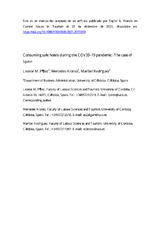Mostrar el registro sencillo del ítem
Consuming safe hotels during the COVID-19 pandemic: the case of Spain
| dc.contributor.author | Pérez Naranjo, Leonor | |
| dc.contributor.author | Alonso, Mercedes | |
| dc.contributor.author | Rodríguez, Maribel | |
| dc.date.accessioned | 2024-01-30T09:47:42Z | |
| dc.date.available | 2024-01-30T09:47:42Z | |
| dc.date.issued | 2021 | |
| dc.identifier.issn | 1368-3500 | |
| dc.identifier.uri | http://hdl.handle.net/10396/26819 | |
| dc.description.abstract | Since the beginning of the COVID-19 pandemic, many hotels have become safe hotels. Nevertheless, the understanding of the consumption of safe hotels is very limited. This study explores pull motivations and behaviors (intention to stay and willingness to pay premium) of potential consumers residing in Spain regarding safe hotels during the COVID-19 pandemic. Based on the social Exchange theory, this research provides greater understanding of the consumption of safe hotels, aiming to explore the impact of the new safety attributes of hotels on consumer behavior. This research reveals the significance of these new safety attributes that have emerged from the pandemic, as part of hotels recovery plans, originating new consumer segments. | es_ES |
| dc.format.mimetype | application/pdf | es_ES |
| dc.language.iso | eng | es_ES |
| dc.publisher | Taylor & Francis | es_ES |
| dc.rights | https://creativecommons.org/licenses/by-nc-nd/4.0/ | es_ES |
| dc.source | Current Issues in Tourism Volume 25, Issue 23: COVID-19, pp 3741-3746 (2022 ) | es_ES |
| dc.subject | COVID-19 | es_ES |
| dc.subject | Safe hotel | es_ES |
| dc.subject | Motivation | es_ES |
| dc.subject | Intention | es_ES |
| dc.subject | Willingness to pay premium | es_ES |
| dc.subject | Social exchange theory | es_ES |
| dc.title | Consuming safe hotels during the COVID-19 pandemic: the case of Spain | es_ES |
| dc.type | info:eu-repo/semantics/article | es_ES |
| dc.relation.publisherversion | https://doi.org/10.1080/13683500.2021.2015300 | es_ES |
| dc.rights.accessRights | info:eu-repo/semantics/openAccess | es_ES |

